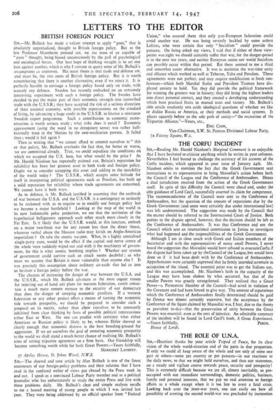THE CORFU INCIDENT
SIR,—Reading Mr. Harold Nicolson's Marginal Comment is so enjoyable that I have hesitated to criticise anything which he writes in your columns. Nevertheless I feel bound to challenge the accuracy of his account of the Corfu incident, which appeared in your issue of January 24th. Mr. Nicolson omits to mention the fact that the Greek Government sent instructions to its representative to bring Mussolini's action before both the Council of the League and the Conference of Ambassadors. Hence a dual jurisdiction resulted from the action of the Greek Government itself. In spite of this difficulty the Council went ahead and, under the able guidance of Lord Cecil, successfully asserted its claim for competence. The recommendations of the Council were sent to the Conference of Ambassadors, but the question of the amount of reparations due by the Greek Government (and some were certainly due under international law) was left undetermined. The suggestion was made by the Council that the matter should be referred to the International Court of Justice. Both parties to the dispute agreed, however, that the decision should be left to the Conference of Ambassadors. It was that Conference and not the Council which sent an international commission to Janina to investigate what had happened and the responsibilities of the Greek Government.
Although I ani in close touch with Greek and Italian members of the Secretariat and with the representatives of many small Powers, I never heard the suggestion that Mussolini would have refused to evacuateCorfu if the dispute had been taken up by theCouncil of the League, but would have done so if it had been dealt with by the Conference of Ambassadors. Apprehensions were certainly expressed that he firmly intended toremain in occupation of the island. The essential point was to get the Italians out, and this was accomplished. Mr. Nicolson's faith in the capacity of the League may have been shaken by what occurred, but that of the smaller Powers was greatly strengthened. They realised that a Great Power—a Permanent Member of the Council—had acted in violation of the Covenant and had been forced to give way. The amount of reparations which the Conference of Ambassadors finally determined should be paid by Greece was almost certainly excessive, but the acceptance by the Conference of the figure claimed by Mussolini was, I fear, due to the theory so prevalent to-day—that the preservation of unity between the Great Powers was essential, even at the cost of injustice. An admirable summary of the incident will be found in Lord Cecil's book, A Great Experiment.
House of Lords.


































 Previous page
Previous page